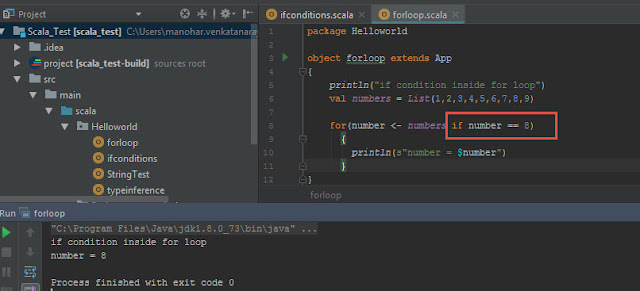for loop:
Repeatation of execution until the specific cycles.
1)Iterating 1 to 5 number in scala using to keyword:
Example:
Note:
keyword to which meant that iteration number 5 is included.
2)Iterating 1 to 5 number in scala using until keyword:
Example:
Note:
keyword until which meant that iteration number 5 is not included.
3)if conditions in for loop as well:
if clause to add filtering support as you iterate through your items.
Example:
4)if conditions in for loop and return the result back using the yield keyword:
using the {} in our for loop to make our expressions more explicit.
Example:
5)for loop usage in 2-Dimensional array:
In scala, to work with 2-Dimensional arrays. There is a Scala Array class and the appropriate ofDim() function, pass in the type of String in square brackets [String] and then specify R by C array in the function parameter.
Syntax:
Declaration:
Then as usual, loop through it for each occurrence.
Example:
While loop:
Executes the block of code, only if the condition is true.
Example:
do while loop:
do {} will be ran at least once regardless of the condition within the while() clause.
Example:
Repeatation of execution until the specific cycles.
1)Iterating 1 to 5 number in scala using to keyword:
Example:
Note:
keyword to which meant that iteration number 5 is included.
2)Iterating 1 to 5 number in scala using until keyword:
Example:
Note:
keyword until which meant that iteration number 5 is not included.
3)if conditions in for loop as well:
if clause to add filtering support as you iterate through your items.
Example:
4)if conditions in for loop and return the result back using the yield keyword:
using the {} in our for loop to make our expressions more explicit.
Example:
5)for loop usage in 2-Dimensional array:
In scala, to work with 2-Dimensional arrays. There is a Scala Array class and the appropriate ofDim() function, pass in the type of String in square brackets [String] and then specify R by C array in the function parameter.
Syntax:
Declaration:
val varible_name = Array.ofDim[String](R,C)Initialization:
varible_name[R1][C1]=valuevarible_name[R1][C2]=valuevarible_name[R2][C1]=valuevarible_name[R2][C2]=value
Then as usual, loop through it for each occurrence.
Example:
While loop:
Executes the block of code, only if the condition is true.
Example:
do while loop:
do {} will be ran at least once regardless of the condition within the while() clause.
Example:











No comments:
Post a Comment